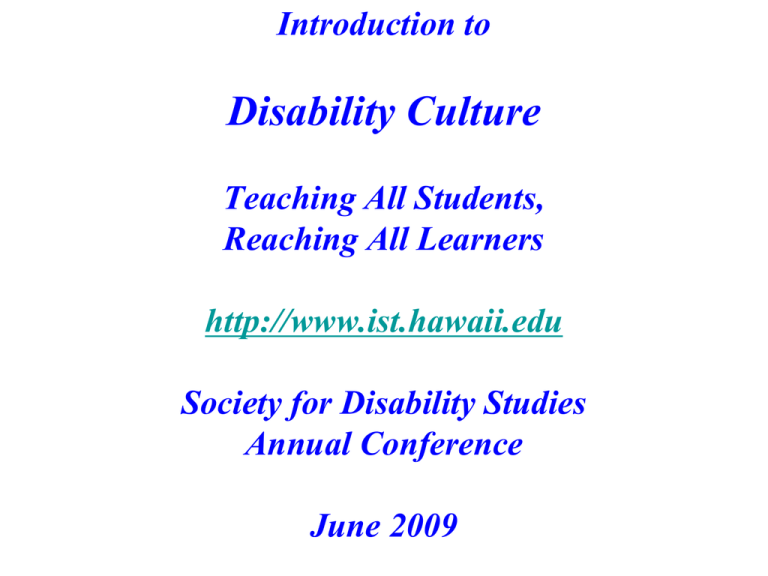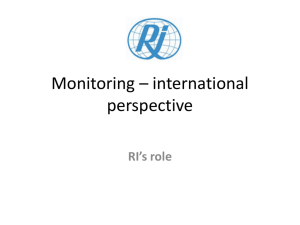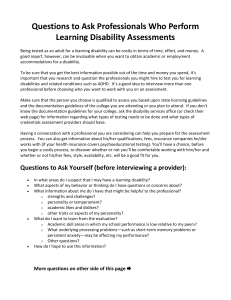
Introduction to
Disability Culture
Teaching All Students,
Reaching All Learners
http://www.ist.hawaii.edu
Society for Disability Studies
Annual Conference
June 2009
Steven E. Brown, Ph.D.
Associate Professor
Center on Disability Studies
University of Hawai‘i at Manoa
Honolulu, HI
Email: sebrown@hawaii.edu
Welcome to the World of
Disability Culture
A Magical Mystery Tour
“The magical mystery tour
is waiting to take you away,
Waiting to take you away.”
(Lennon, McCartney)
“The Fishing is Free”
by Jane Field
The fishing is free with your disability
You don't need a license like the rest.
Movies are half the price, well isn't that nice?
And the parking spots are nothing but the best.
Don't you wish that you were disabled?
Disabled is the better way to be.
With crutches, canes and braces, and wheelchairs to run races
Don't you wish that you were just like me?
“The Fishing is Free”
(continued)
With Wheel-Trans to get about, it's a wonder we go out
It's so much fun to try to book a ride.
You phone 4 days ahead and if you're lucky so it's said
You might get there, but if you don't, don't be surprised.
Don't you wish that you were disabled?
Disabled is the better way to be.
Some chairs are motorized and high-tech computerized
Don't you wish that you were just like me?
“The Fishing is Free”
(continued)
The deaf have got sign language,
the blind have got their dogs
Their loyal trusted guides are at their sides.
Well everyone has their vices, but we've got our devices
Don't you envy us our privileged lives?
Don't you wish that you were disabled?
Disabled is the better way to be.
When we go out it's really neat,
we're always sure we'll get a seat
Oh, don't you wish that you were just like me?
“The Fishing is Free”
(continued)
No one knows just what to call us
which label should befall us,
And they're some dandy terms from which to choose.
My favourite's "wheel-chair bound" cause it has a
bondage sound.
It's fun to guess what term they're going to use.
Don't you wish that you were disabled?
Disabled is the better way to be.
There are special entrances in stores, they let us in
through the back doors
Oh, don't you wish that you were just like me?
“The Fishing is Free”
(continued)
I tell you we've got all the breaks,
'cause we've got what it takes
I haven't even mentioned income tax.
There are credits and reductions to give us tax deductions
When April comes I guess we can relax.
Don't you wish you wish that you were disabled?
Disabled is the better way to be.
With all these benefits and perks that's
how the system works
Oh, don't you wish that you were just like me?
“The Fishing is Free”
(continued)
The fishing is free with your disability
And you don't need a licence like the rest.
Movies are half the price, well isn't that nice?
And the parking spots are nothing but the best!
TELL YOUR STORY
Steven E. Brown
©Institute on Disability Culture, 1995, All Rights Reserved
http://web.mac.com/disculture/Tell_Your_Story/The_Poem.html
Tell your story
Tell your story
It may bump from the page
like words of Braille
sizzling in tales of blazing glory;
it may glisten in the sunshine like the holy grail,
so tell me a tale, even if it’s gory,
I’m yearning to hear you
Tell your story.
TELL YOUR STORY (continued)
Have you heard
‘bout the man
in the motorized chair?
Found no ramp at the
movie theater
did he despair?
No,
just let them dudes lift him in there.
Came back a few days later
after somethin’ greater
brought with him a crew
people in chairs just grew and grew,
said they knew
they’d be part of the view;
TELL YOUR STORY (continued)
no problem getting in,
just lift and push and
move those hunks of tin.
The chairs, they weighed a-plenty,
The ushers stressed and
strained and got somewhat benty.
Seeing the movie was not the goal
changin’ the stage was the whole
they paid for getting’ in
but that theater knew it sinned.
People in chairs sealed their own personal stamp
on that theater’s shimmering new wheelchair ramp.
TELL YOUR STORY (continued)
Tell your story
Tell your story
It may enrapture the floating air
like ASL singing its flair
it might even glisten like the holy grail,
but no one will set their sail
toward your tale,
even if it’s hunky-dory,
unless you tell your story
Tell your story.
TELL YOUR STORY (continued)
Once I knew a lady
got caught in a picket line
changed her whole design:
came back to her hometown
mission bound.
Told a hospital it was ailing
cause it was failing to see
good health bound in the key of
phone lines hooked up with a TDD.*
Said she’d seek cooperation or
she’d be mighty angry
might even round up folks and
stoke fires of insurgency,
TELL YOUR STORY (continued)
gather signatures and seek publicity.
You know that hospital saw the light
put an end to the no TDD blight.
Last time I saw that lady
she was waving a sign
telling a TV station
she sure did mind
no news she could see
so why should she
listen to what they wanted her to be.
Now she knows how to stick it
with a picket and her
pockets have been lined with Advocacy.
TELL YOUR STORY (continued)
Tell your story
Tell your tale
You will find you touch
with the sureness of a crutch
a framework for your dwelling,
a story needing telling,
steaming like a sunburnt trail
glistening like the holy grail.
Who will know what you entail
unless you risk the path to glory
tell your story
Tell your story.
TELL YOUR STORY (continued)
Does he want another cup of coffee?
I heard the waitress ask about the man.
How did I know his plan?
Just cause he couldn’t see
didn’t mean his brain rested in incompetency.
The stories he has told
brisk and bold
I’ve shared with more than a few
over a cup of coffee or a tall, cold brew.
TELL YOUR STORY (continued)
The lessons are in the telling
they provide a framework and a dwelling.
We all have so many stories to bear
Cry, laugh, sing, and despair;
how will our children learn and compare
if we’re too timid to dare
to raise the flare
share that we care.
Tell your story
Sing your tale
Tell our story
Shout our glory!
TELL YOUR STORY (continued)
Tell our story
Tell our story
It may not bring fame
It may have no glory, but
cut through someone’s life like a ray of sunshine
break away barriers like a layer of turpentine,
tell your story
Tell your tale
We’re not as elusive as that holy grail.
Steve’s Definition
People with disabilities have forged a group identity.
We share a common history of oppression and a
common bond of resilience. We generate art, music,
literature, and other expressions of our lives and our
culture, infused from our experience of disability.
Most importantly, we are proud of ourselves as
people with disabilities. We claim our disabilities
with pride as part of our identity. We are who we
are: we are people with disabilities.
(Brown, Movie Stars and Sensuous Scars, pp. 80-81)
What is Disability Culture (US
Perspectives)?
Most people who are disabled do not have parents who
are disabled.
That means we are different than other cultures who
learn their culture from their parents, we have to
learn it from each other.
Not all people agree people with disabilities have a
culture, but there are thousands of disability rights
groups, books and materials that explain we do.
Naomi Ortiz, Project Director
Kids as Self Advocates: “What is Disability Culture?”
http://www.fvkasa.org/resources/files/history-culture.html
What is Disability Culture (US
Perspectives)? (continued)
Disability Pride is an integral part of movement building,
and a direct challenge to systemic ableism and
stigmatizing definitions of disability. It is a militant act of
self-definition, a purposive valuing of that which is
socially devalued, and an attempt to untangle ourselves
from the complex matrix of negative beliefs, attitudes,
and feelings that grow from the dominant group's
assumption that there is something inherently wrong with
our disabilities and identity.
Sarah Triano, Encyclopedia of Disability (2005)
http://www.disabledandproud.com/power.htm
What is Disability Culture
(Global Perspectives)
Culture is about the life styles of population groups, whether large or small,
national, or local, or even international. It cannot be imposed on us by leading
disabled individuals from the top down, any more than it could, or can, be
imposed upon us by occupational therapists, art therapists, or any other
therapists that are forced upon us in the future. It must arise out of the
spontaneous desire of disabled people to share our feelings, experiences and
desires, our loves and hates, our pleasures as well as our sufferings, amongst
ourselves. In other words, we have to make the choice that we want to identify
ourselves as disabled people.
Vic Finkelstein, DAIL (Disability Arts in London)
http://www.independentliving.org/docs3/finkelstein87a.html
What is Disability Culture
(Global Perspectives-continued)
Osamu Nagase, Professor, Graduate School of Economics,
University of Tokyo, translates:
Asaka, a disabled activist in Japan, who had been exposed to
Aoi Shiba, responds; "My disability is my identity" and "I,
not only myself I think, don't really care whether I have a
disability or not, in my next life, if there is no social
disadvantage and if there is no discrimination".
What is Disability Culture
(Global Perspectives-continued)
Heng-hao Chang, who wrote his dissertation about the disability rights
movement in Taiwan, asserts in a later article:
To a large extent, people do not realize that disability is
everywhere. I have become more aware of the veil of disability around
myself in the process of taking disability studies seminars and doing
research on the disability rights movement in Taiwan. The problem of
the twenty-first century is the problem of how society defines the
“normal” and treats the “different.” (Chang, 2007, p. 10)
“Disability Is My Culture”
Rachel Scoggins
Tucson, AZ
Is Disability Culture Diverse?
Examples of Diverse Videos:
Axis Dance Company: Waypoint:
http://www.youtube.com/watch?v=FK2WEAkpfns&feature=channel
Josh Blue: http://www.youtube.com/watch?v=qMSrpZi_6WM
Jesper Odelberg/Boys on Wheels:
http://www.youtube.com/watch?v=Wg1NfoBxzHo
AccesSurf Hawaii (October 2007):
http://www.freedomhi.com/video/video_access_surf.html
Identifying Disability Culture
When entering “disability culture”
Google
43,700
59,400
64,600
54,100
49,300
Yahoo
April 9, 2008
June 23, 2008
Sept. 5, 2008
Oct. 29, 2008
March 21, 2009
280,000
347,000
429,000
286,000
384,000
Using Disability Culture
How might knowing about or having examples
of disability culture be useful?
1. Explain why people with disabilities think
our culture is important.
2. Use examples to demonstrate disability
rights, history, talents and resources.
Assistive Technology Boogie
by Jeff Moyer
http://www.inclusive.com/AT_boogie/at3
0.swf
Future Research Directions
*Further identify and publicize examples of disability culture in nonEnglish speaking countries.
* Research how distinctions between various languages/dialects influence
disability culture in diverse geographical areas.
*Investigate if disability culture does, or should, advance disability rights
and advocacy issues.
*Describe how disability culture is communicated from one person, or one
group, to another?
References
Brown, S. E. (2003). Movie stars and sensuous scars: Essays on the journey from disability shame to disability
pride. New York: People with Disabilities Press.
Brown, S. E. (1994). “Tell your story.” Pain, plain and fancy rappings—Poetry from the disability culture. Las
Cruces, NM: Institute on Disability Culture. Available
at:http://web.mac.com/disculture/SiteExamples_of_our_Disability_Culture.html
Chang, H. (2007). Seeing through the veil: Auto-ethnographic reflections on disabilities. The Review of Disability
Studies: An International Journal, 2 4), 10.
Field, J. (1994). “The Fishing is Free.” Available from Jane at 18 Concorde Place, Apt. 517Toronto, OntarioM3C
3T9Canadaemail: jane.and.hil@sympatico.ca
CD's are US $15, including postage.
Finkelstein, V. (1992). Disabled people and our culture Development. DAIL (Disability Art in London) magazine
Anthology: The first five years. London: DAIL Magazine, 3-6.
Lennon, J. and McCartney, P. (1967). “Magical Mystery Tour.” Available at many online music site.
Moyer, J. Music from the Heart. http://www.jeffmoyer.com
Nagase, O. (Dec. 1995). Difference, equality and disabled people: Disability rights and disability culture. Partial
fulfillment of MA in Politics of Alternative Development Strategies at the Institute of Social Studies, the
Hague, the Netherlands, quotes on pp. 80, 94.
Triano, S. (2006). Disability Pride. Encyclopedia of disability. Ed. Gary Albrecht. Vol. 1. Thousand Oaks, CA:
Sage, 476-77.
More on Disability Culture
Institute on Disability Culture:
http://web.mac.com/disculture
Steve Brown: sebrown@hawaii.edu








